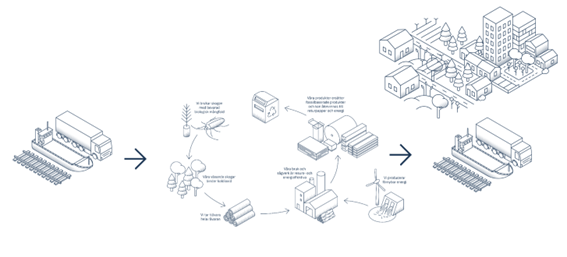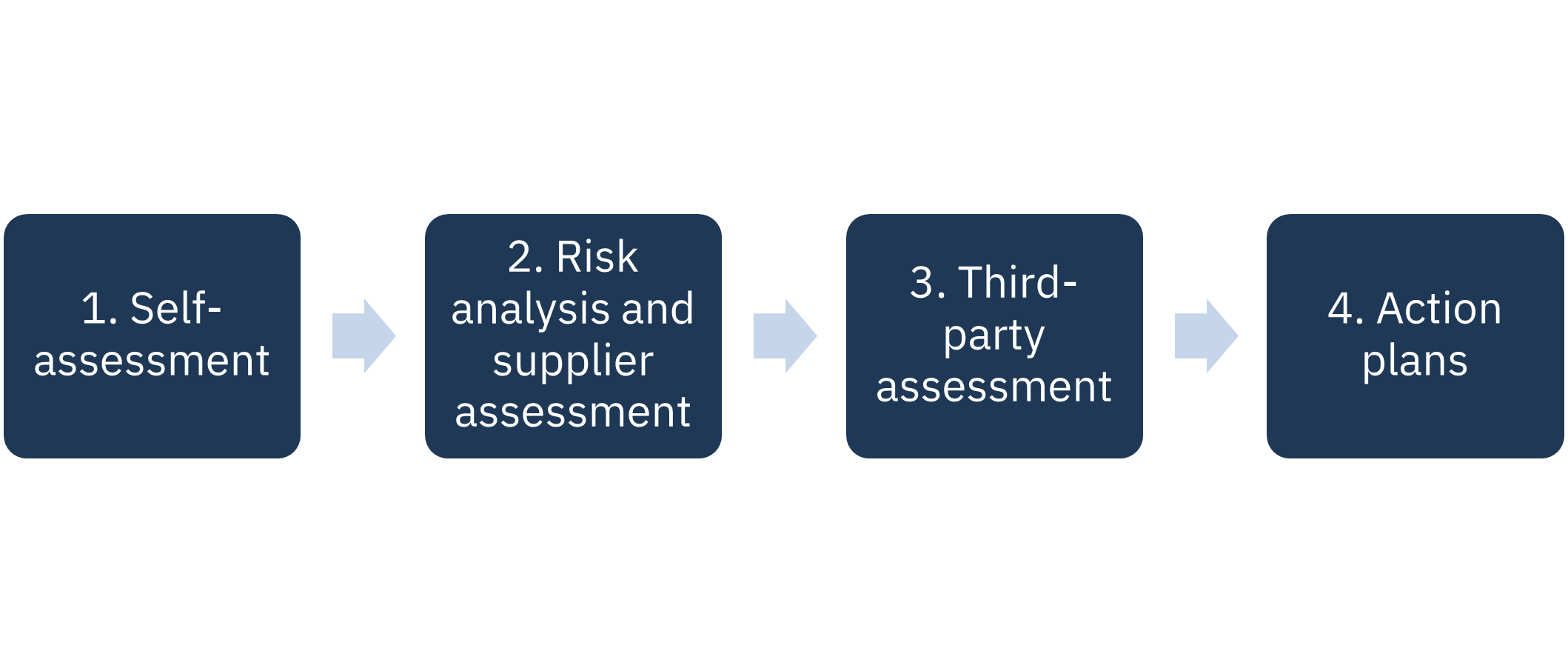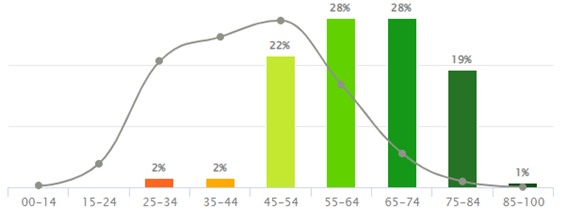Holmen’s purchasing function is to contribute to the company’s long-term profitability by ensuring a sustainable supply of goods and services. The purchasing function is also tasked with identifying, evaluating and preventing risks in our supply chain. Holmen’s purchasers are constantly trained in our purchasing policy, the Supplier Code of Conduct, ethical purchasing guidelines and supplier risk management.
Holmen’s value chain
Holmen’s business begins in the forest. Using our own production facilities, the growing trees are refined into everything from wood for climate-smart building to renewable packaging, magazines and books, while at the same time we generate hydro and wind power on our own land. Efficient management of raw materials and circular ecocycles are vital to our profitability.
Read more about Holmen's value chain here.

Supplier Code of Conduct
Holmen has had a Supplier Code of Conduct for many years now. The Code follows the UN’s guidelines and includes the requirement that our suppliers must respect internationally recognised principles concerning anti-corruption, human rights, health and safety, and environmental impact. Holmen supports the ten principles of the UN Global Compact, the eight core conventions of the International Labour Organization (ILO) and the OECD’s guidelines for multinational enterprises. The Code of Conduct is based on these principles and clarifies what Holmen expects of its suppliers.
Holmen’s Supplier Code of Conduct is included in all new contracts and at the end of 2022, suppliers representing 88 per cent of the Group’s purchasing volume were judged to comply with its principles. In 2022, no cases regarding breach of the Supplier Code of Conduct were reported.
Download Holmen's Supplier Code of Conduct here.
Supplier structure
Holmen has agreements with a large number of suppliers. Our most important raw materials are wood and electricity, much of which we produce ourselves. This gives us control of our supply chain and minimises potential risks in the supply chain. Besides these, our largest purchasing areas are transport, input goods and production material. We are also a major purchaser of contracted services linked to our forestry.
The majority of our suppliers are in Sweden and Scandinavia. A small number of suppliers are based in Western Europe and purchasing from other parts of the world is very limited. No new suppliers of significant materials or services were added in 2022.
Our approval process and close collaboration with our suppliers ensure that we live up to Holmen’s environmental and social requirements. The process sees us creating a responsible, sustainable and long-term supply chain.
The war in Ukraine and the effects of the pandemic have made it more difficult and expensive to acquire certain goods and services. We have actively worked to limit the effects and have been able to avoid disruptions to production.
Wood and energy supply
Our largest categories are suppliers of wood and electricity. As Holmen is one of Sweden’s largest suppliers of both, we have a good insight into the risks that production can involve. We make use of well-developed chain-of-custody mechanisms for the wood and electricity we buy in, to ensure that it is sustainably produced.
Read more about how we ensure that our purchasing of wood and electricity is sustainable here:
Transport
When purchasing transport, we require that our suppliers only use known, contracted subcontractors who meet the criteria we set for our suppliers. This is in order to ensure that we solely hire responsible transport firms throughout our value chain.
We are also making a conscious shift to intermodal transport, which means that on shorter domestic routes our goods are transported by road to a transloading site where the load is transferred to train or ship for the longer part of the journey. This enables us to avoid long, international journeys by road, which can involve both higher health and safety risks and a greater environmental impact.
Read more about Holmen's transport work here.
Input goods and production material
Besides wood, energy and transport, input goods and production materials are our largest strategic purchasing areas. Here we use an external partner, EcoVadis, to evaluate the sustainability of our suppliers.
Assessment and follow-up
We are proud of the high quality of the raw materials we produce ourselves on our land and deliver to our own production facilities. We are determined to ensure that our suppliers uphold the same high quality and therefore conduct assessments and follow-up on our suppliers’ performance in relation to business risks, human rights and labour law, the environment, business ethics and sustainable purchasing.
Our starting point is that both us and our suppliers benefit from working together to ensure a sustainable supply chain. We therefore work with our suppliers to develop their sustainability efforts.
The process

- We primarily focus on recurring and larger suppliers of input goods and production material. These actors undergo an approval process in the form of self-assessment and must also accept the principles laid down in Holmen’s Supplier Code of Conduct.
- A risk analysis linked to Holmen’s criteria for human rights, labour law, the environment, business ethics and sustainable purchasing is carried out for all suppliers where purchasing exceeds SEK 1 million. Suppliers associated with a high risk then need to undergo a more in-depth third-party assessment.
- Holmen hires an external body, EcoVadis, to conduct an in-depth assessment of how well suppliers are complying with the principles of our Supplier Code of Conduct.
- Action plans are initiated for any suppliers that fail to attain Holmen’s pass level in this assessment. If a supplier does not demonstrate positive development at the speed desired, or if Holmen becomes aware that a supplier is in breach of the Code of Conduct, an on-site audit is carried out.
Results 2022
By the end of 2022, 130 suppliers had completed an EcoVadis assessment, i.e. been evaluated on business ethics, the environment, anti-corruption and human rights.
97 per cent of our assessed suppliers scored above our pass level of 45.

3 per cent of these suppliers’ EcoVadis results were below Holmen’s pass level and we launched a corrective action plan for 50 per cent of these.
Of the suppliers we have evaluated and followed up in 2022, no supplier has been found to have a heightened risk related to the principles in Holmen’s Supplier Code of Conduct.
Holmen’s supply chain has not noticeably changed in 2022. No new suppliers have been judged to require a full supplier assessment. We have not ended any supplier collaboration due to shortcomings in the supply chain.

